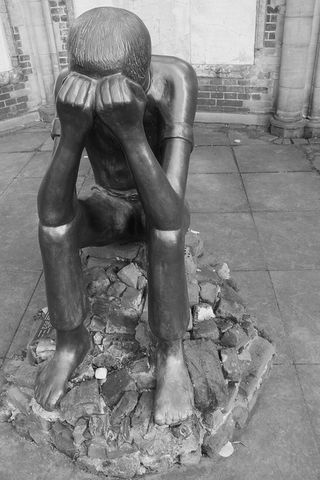Attention
A Lesson Learned From Auschwitz: Who Am I to Judge?
The phrase “Who am I to judge?” is a call to ponder the need for reflection.
Posted October 12, 2015

“If I wasn't in Auschwitz I wouldn’t believe that such a thing could exist,” my mother said, as quickly and casually as if she had said she wanted to go shopping with me at the mall.
I raised my eyebrows and waited for her to elaborate.
My mother continued, “You know, if I hadn’t been in that place I probably wouldn’t have believed that human beings are capable of such behaviors. I learned a lot about human behavior in the camps.”
Her declarations should not have surprised me, I suppose, since she spoke truthfully about her experiences in a concentration camp.
I was mesmerized, as I always was, by my mother’s assessment of her experiences in a concentration camp; appraised, like an analysis of a book, but also, a truthful, thoughtful reflection of the way, as a young woman, she had seen things then.
“Mommy, how did you actually survive Auschwitz?” I asked.
“I was young and I wanted to live,” said my mother matter-of-factly.
I persisted. “But what did you do to survive?”
"You know I was lucky. I had a good job. I was in the Canada barracks.”
The prisoners gave the concentration camp barracks nicknames. The buildings holding looted Jewish property were called “Canada barracks” because Canada was considered the rich New World. When the transports arrived at Auschwitz, the prisoners on the trains were told to climb down with their luggage and deposit it alongside the train. If someone dared to ask for his or her luggage, they were told they would get the luggage afterward. The luggage would then be brought by a transport detachment to Canada, where it would be sorted. The luggage of those who had been gassed was also brought to Canada.
My mother’s job, I learned, was to sort the shoes.
“I was fortunate because it was indoor work and I could trade the shoes for food,” said my mother. She looked at me in a way that encouraged me to say, “I understand.”
She continued, “The transports of the Hungarian Jews were coming so fast and so many. The crematoria could not keep up with the gas chambers. The arrival of these Hungarian Jews with their luggage offered me many opportunities. If you had things to trade, you were better off. I could buy the best food.”
“You mean, Mommy, you traded things that came from the suitcases of those Hungarian Jews who were sent to the gas chambers?” I knew that I was probably being a little too critical, but I was flummoxed and tried to understand.
My mother’s response was puzzling. “I remember one day some new girl joined our workforce. We were sorting through the shoes and suddenly this girl started to cry loudly. ‘Look at the fire burning and the smoke. Fire, fire everywhere. It never stops burning.’ We thought the new girl was crazy. She would not stop crying out. You know we were doing the work for a long time. We did not even notice the fire or smoke anymore. Maybe we were the crazy ones?”
Then my mother’s voice changed. “Sometimes I feel ashamed of it, but that’s how it was. I know the attitude was not right. But was it wrong? I was young and I wanted to live. You can’t judge; you never know what you would do in those circumstances.”
My mother’s admonition to refrain from judging reminds me of the Pope’s recent famous phrase "Who am I to judge?" he asked. Pope Francis was giving a press conference on a flight back from Brazil. He was addressing the issue of gays in the church. The phrase caught the public's attention. The fact that the pope—the trustworthy leader of the worldwide Catholic Church and the world's 1 billion Roman Catholics—declined to sit in judgment of gay priests was welcomed as remarkable, even revolutionary.
My mother was not relativizing all behaviors in the concentration camp. She was not implying all the behaviors were the same. She suffered too much. Every family member (besides a few cousins) was killed by the Nazis.
Likewise, Pope Francis was not obfuscating the differences between good and evil or between moral and immoral behaviors.
Rather the phrase “Who am I to judge?” is a call to ponder the need for psychological reflection and soul searching. It shines the light on us. Or as the Buddha said to his disciples: “Be lamps unto yourselves.”
Copyright © Mona Sue Weissmark All Rights Reserved


